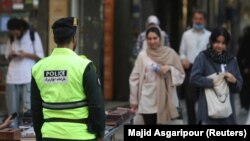A growing body of evidence shows a direct link between the equality and empowerment of women and a nation’s stability. But that is a link the Iranian regime refuses to recognize.
After the September death in custody of Iran’s “morality police” of 22-year-old Mahsa Amini, arrested for violating Iran’s Islamic dress code, the country erupted into massive, nation-wide protests. Thousands of people, led by women but joined by their husbands, sons, brothers, and friends, took to the streets over Amini’s death and over the mandate that requires women to wear the hijab to cover their hair and loose clothing to cover their bodies. Those demonstrations, with their rallying cry of “Women! Life! Freedom!” turned into protests against the corruption, mismanagement and repression of the regime. It was the largest challenge to the rule of the Islamic Republic of Iran since its founding in 1979.
Iranian leaders responded by temporarily halting patrols by the morality police; but also, by brutally cracking down on the protesters: 500 people were killed; 20,000 were arrested; and at least 7 were executed.
Now, two months before the anniversary of Mahsa Amini’s arrest, police authorities have announced that “starting immediately,” they would be patrolling the streets to first warn, and then arrest women who insist on breaking the norm for dress. The announcement follows authorities’ practice earlier this year of shutting down businesses that they accused of serving customers who were not wearing the hijab. In addition, several celebrities have faced prosecution for breaking the law by improperly veiling, including actress Azadeh Samadi.
The United State is concerned over reports of the new crackdown in Iran against women over the compulsory hijab. “It seems the regime has learned nothing from the recent protests,” State Department Spokesperson Matthew Miller said.
National Security Coordinator for Strategic Communications John Kirby declared, “Iranian women should be able to decide for themselves how they’re going to observe their faith and how they’re going to dress in public.” He noted the United States has already sanctioned members of Iran’s morality police and other entities involved in Iran’s brutal crackdown that led to the deaths and injuries of protesters. “If we believe that we need to take additional action to put more pressure on the regime,” he said, “we’ll do that.”






